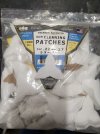Randy Tidwell
Well-Known Member
I do use brushes. But I am very particular about them. Only use once and then in the trash. At a BR match, I will use one brush for a match. Then trash.
Regarding patches. These are best patchs I've found and use them exclusively! You can order them on line.
Regarding patches. These are best patchs I've found and use them exclusively! You can order them on line.

